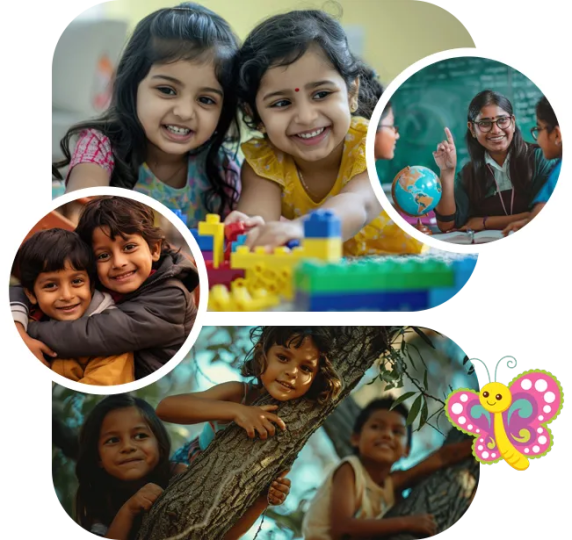
FORTISTEPS -SOCIAL AND EMOTIONAL LEARNING PROGRAMS ENHANCING SKILLS AND FORTITUDE
INTRODUCTION:
Social Emotional Learning (SEL) aims at the holistic development of an individual during their growing years. Those enriched through SEL spaces are equipped to understand and manage their emotions, build meaningful relationships, set and achieve positive goals, and make choices that demonstrate empathy and for the larger good.
FortiSteps, the FairGaze SEL Programme is our commitment to FairGaze's vision and mission to “Empower students to discover their potential and succeed as responsible global citizens” and “to develop an ecosystem that allows children to expand their horizon of awareness, develop their innate talents and explore multitude of skills while ensuring their physical, social and mental wellbeing.”
PROGRAM OVERVIEW:
FortiSteps builds SEL competencies of Self- awareness, Self-management, Social-awareness, Responsible decision-making, and Relationship skills based on globally accepted practicebased research.
The Programme blends structured everyday interactive activities, reflective practices, games and a rich array of curated resources to engage and support students, parents, mentors and school systems in fostering SEL spaces in school, home and the community.

CAPACITY BUILDING FOR STUDENTS

Emotional Regulation
Helps students learn how to identify, understand, and regulate their emotions. This enables them to manage stress, reduce anxiety, and cope effectively.

Improved Academic Performance
Emotionally balanced students perform better in class, retain information, and develop a positive mindset toward learning.

Enhanced Social Skills
Students learn to interact effectively with peers, teachers, and others, improving communication and empathy.

Better Decision Making
Encourages thoughtful choices by helping students consider consequences and take responsibility.

Increased Self Confidence
Builds emotional intelligence and self-belief, empowering students to approach challenges confidently.
“Ensures higher levels of attention and emotional and cognitive regulation that are necessary not only for well-being, empathy towards others, and lower stress, but also leads to increased academic success.”
- NCF-FS 2022FORTISTEPS SELP BENEFITS
FOR SCHOOL:
FOR MENTORS:
FOR PARENTS:
5 Modules
I AM AN EXPLORER – SELF-AWARENESS
Like the ever curious squirrel,learns to be curious, observe oneself in a context, to understand one’s own emotions, thoughts, and values.
I AM A CONTRIBUTOR – SELF-MANAGEMENT
Like the conscientious ant, learns to contribute to regulate emotions, thoughts, and behaviours to manage stress, control impulses, and achieve goals. Identify the tasks one does, and the steps to follow, assess how much can be done on own, when to ask for help, and when to give a pat on back for effort.
I AM A COLLABORATOR – SOCIAL AWARENESS
Like the social dolphin colloborates, cooperates and understands collaborates to understand social situations, others’ perspectives, and recognizes and shows empathy.
I AM A CREATOR – RESPONSIBLE DECISION-MAKING
Like the adaptable and innovative crow, communicates complex information, makes positives choices, considers consequences and evaluates option Makes positive choices, considering consequences, and evaluating options. Find ways to encourage good for everybody.
I AM REFLECTIVE – RELATIONSHIP BUILDING
The wolf and the raven exhibits a symbiotic relationship based on deep understanding of each element around them. reflects on how to build and maintain healthy relationships with a diversity of people and groups by listening actively, communicating with clarity and empathy. Finds constructive solutions to conflicts without falling to pressure, and asks for and offers help. Thinks about how to make positive connections with others to establish and maintain healthy, and thriving relationships.
FOR SCHOOL MANAGEMENT
- Aligned to global education focus and supported by cutting-edge SEL research
- Data-driven insights and progress tracking
- Long-term impact on school culture and enhanced school reputation

















